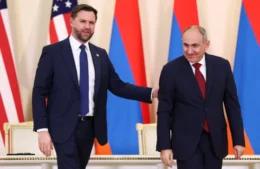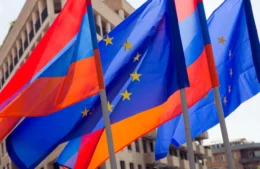Zoryan Institute Brings Armenian Narratives to Genocide Awareness Week in Arizona
- (0)

The Zoryan Institute is pleased to announce its return for the second consecutive year to Genocide Awareness Week, an event hosted at Arizona State University (ASU) from April 15-19, 2024.
The 12th Rosenbluth Family Charitable Foundation Genocide Awareness Week brings together a series of lectures, exhibits and storytelling by distinguished survivors, scholars, politicians, activists, artists, humanitarians and members of law enforcement, seeking to address how we, as a global society, confront violent actions and current and ongoing threats of genocide throughout the world, while also looking to the past for guidance and to honor those affected by genocide. It is the largest event in the United States dedicated to genocide education and awareness.
At the heart of the Institute’s participation lies a commitment to showcase Armenian stories, while understanding genocide as a universal human experience.
This year’s conference theme of nationalism, state violence and genocide revolves around the role of the state in facilitating and shaping the perpetration of genocidal violence. By focusing on the genocidal state, Genocide Awareness Week 2024 seeks to explore and examine different forms of authoritarian and exclusionary forms of nationalism; how extremist forms of national identity are constructed and maintained; race and racial science; cultural erasure; religious nationalism, and how mass violence is engineered and facilitated by genocidal states using technology and propaganda and other related topics.
On Thursday, the Zoryan Institute will host two panels, the first centered on a groundbreaking book commissioned by the Institute in 2020 titled Collective and State Violence in Turkey. This work delves into the creation of a Turkish national identity and the treatment of minority groups including Alevis, Armenians, Assyrians, Jews, Greeks, Kurds, and Yazidis, as “internal enemies.” It is the first of its kind to explore a variety of case studies and the actions and impunity of the Turkish state. The panel will feature 3 of the 16 contributing authors of this book, Dr. Ayşenur Korkmaz, Netherlands Institute for Advanced Study in Amsterdam (NIAS), Dr. David Gaunt, University of Calgary, and Dr. Hamit Bozarslan, Ecole des hautes études en sciences sociales (EHESS), each representing a different case study and or theme that was presented in the book, and will be moderated by Dr. Barlow Der Mugerdechian.
The second panel, “The Erasure and Revitalization of Indigenous Cultures and Languages,” is a comparative analysis bringining a diverse group of scholars. Panelists Lorena Fontaine, University of Winnipeg, Lori Khatchadourian, Cornell University, & Talar Chahinian, UC Irvine, will offer perspectives on Indigenous communities in Canada, the United States, Western Armenia, and the Republic of Artsakh (Nagorno-Karabakh). This panel, moderated by Karen Jaratt Snider, seeks to foster dialogue and understanding across Indigenous experiences.
In addition to these panels, the Zoryan Institute will continue its commitment to education in high school classrooms, through the “Promoting Equity, Tolerance, Reconciliation, and Awareness Through Genocide Education Program.” Led by Vicechair of Zoryan Institute’s Academic Board, Prof. Alex Alvarez, this initiative empowers secondary school students in grades 10-12 with a foundational understanding of crimes against humanity and genocide through engaging activities, classroom discussions, and films.
The Institute’s participation in Genocide Awareness Week 2024 underscores its dedication to fostering meaningful conversations on genocide awareness and prevention. By both spotlighting Armenian stories comparatively with others, and engaging with diverse perspectives, the Zoryan Institute as one of the pioneers in the genocide studies field, continues to play a vital role in shaping discourse around the phenomenon of genocide as a universal human experience, its lasting impacts on humanity, and the necessity of its prevention.


















